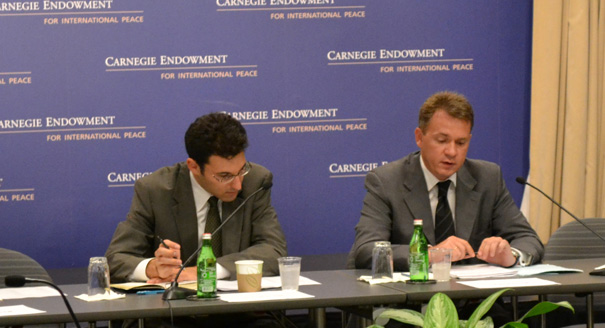Registration
Thank you!
You will receive an email confirming your registration.
IMGXYZ3843IMGZYXFree and fair parliamentary elections in October 2012 are critical to Ukraine’s successful democratic development. To discuss recent election legislation and Ukraine’s next electoral contest, Carnegie hosted Mykhailo Okhendovskyi, a member of Ukraine’s Central Election Commission (CEC) since 2004. He expressed optimism that the upcoming elections would proceed smoothly but noted that Ukraine still suffers from various growing pains as a “young democracy.” Carnegie’s Matthew Rojansky moderated the discussion.
The State of Elections in Ukraine
- Central Election Commission: The CEC is a fully independent body consisting of fifteen members appointed to seven-year terms, said Okhendovskyi. He added that members must sever all personal ties to Ukraine’s 202 registered political parties to ensure impartiality. In preparation for the parliamentary elections this year, the CEC has also passed more than sixty resolutions to guarantee greater efficiency and transparency.
- Prospects for Success: Unlike the 2010 presidential election, which was marred by international criticism, the CEC is working hard to ensure that future elections meet international standards. Although the electoral system is imperfect, recent legislation has created “the most favorable campaign environment” in Ukraine’s history, Okhendovskyi asserted.
- Parliamentary Election Law: The new law approved by President Yanukovych in December 2011 introduces several major changes to parliamentary elections. Although Okhendovskyi argued that the “legal quality of several rules and procedures contained therein was evidently sacrificed to political expediency,” he said that ultimately the law is a step in the right direction.
- Mixed System: Of the 450 members of Ukraine’s parliament, 225 will be elected through party lists and the other half in single mandate districts.
- Electoral Threshold: Political parties must now obtain five percent of the vote in order to acquire seats in parliament, which Okhendovskyi maintained is “generally in line with European political traditions.”
- Ban on Political Blocs: Political blocs are now prohibited from participating in parliamentary elections.
- Parliamentary Opposition: Okhendovskyi described the new law as a “positive political compromise,” noting that it guarantees registration of opposition candidates, greater access to media, and mobile voting.
- Ukrainians Abroad: The 435,000 registered Ukrainian voters living abroad will be able to cast their ballots at 114 polling stations across the globe, but few voters will actually be familiar with the candidates, he said.>
- Lingering Challenges: Although the CEC has introduced technical amendments to improve the election law by filling in “legal gaps,” some Ukrainian politicians have opposed these initiatives and continue to view the law as an “inviolable holy cow,” Okhendovskyi concluded.
Election Monitoring
- Web Cameras: The Yanukovych administration has proposed installing a minimum of two web cameras in each polling station in Ukraine in order to increase transparency. However, Okhendovskyi expressed skepticism that Ukraine’s 33,000 voting centers could be equipped with web cameras in just three months, given that it took Russia five years to organize such a system. If implemented, electronic surveillance would double the cost of the elections, and any technical issues would likely lead to allegations of fraud, he concluded.
- Observers: Okhendovskyi confirmed that election observers may monitor the vote count but cannot “physically interfere” with the local election commissions as they calculate the official tally. Although web cameras are turned off during this process, the CEC and local commissions post the official results online immediately after the count is finalized. He emphasized that Ukraine’s 225 lower-level electoral commissions will receive extensive training ahead of the elections and will respect the rule that “all observers must be treated equally.”
